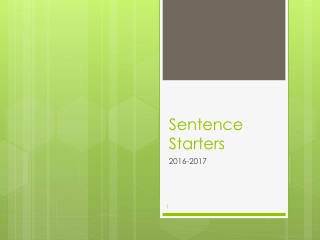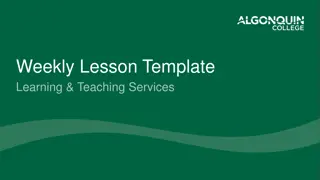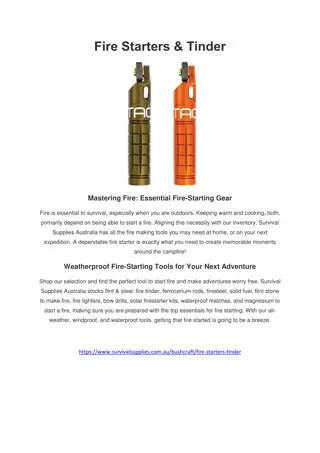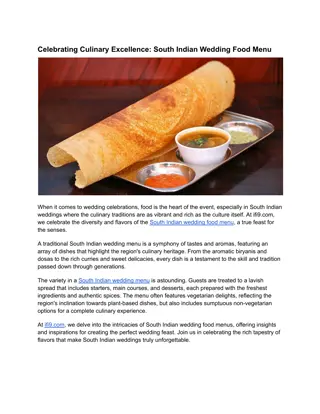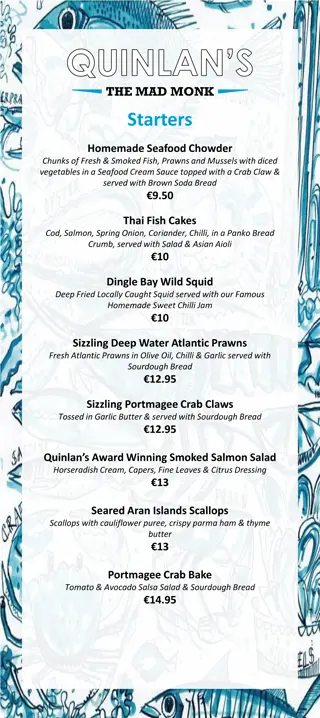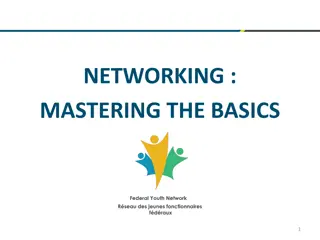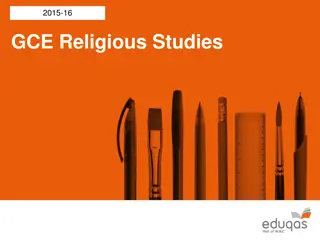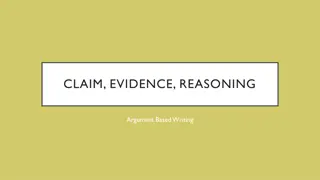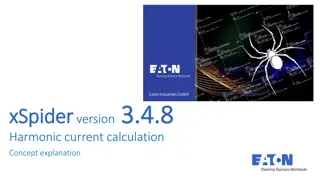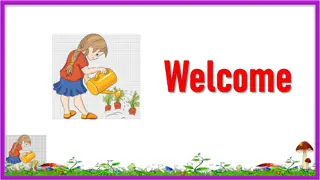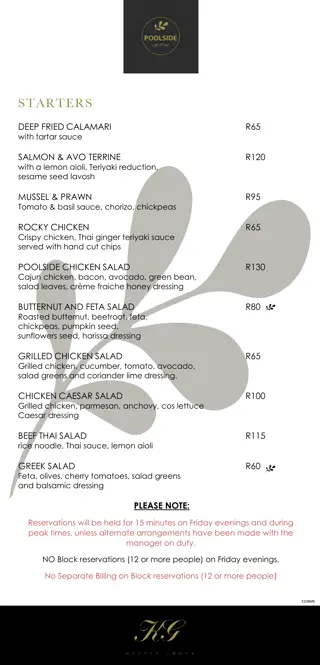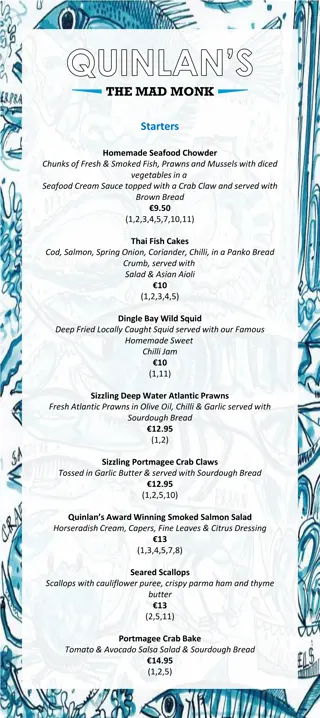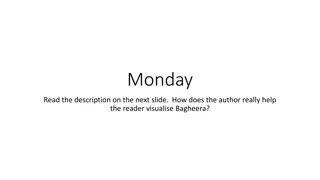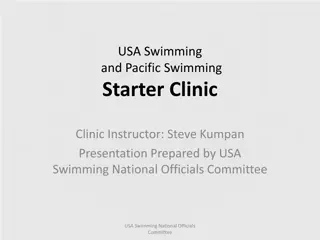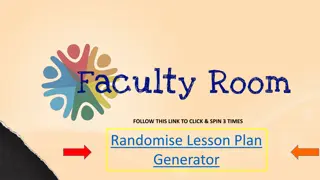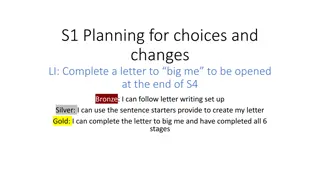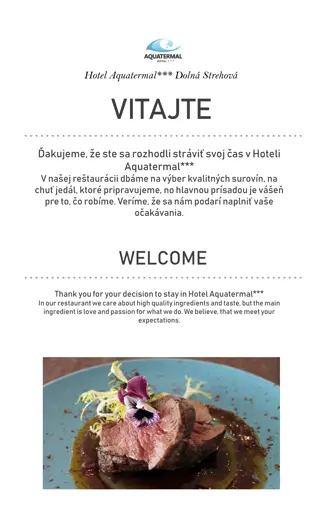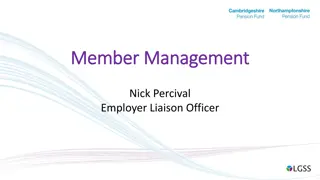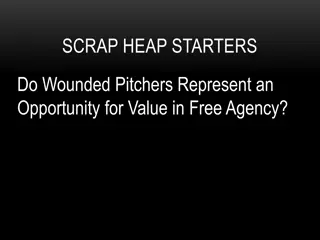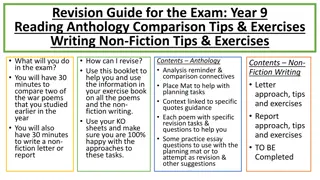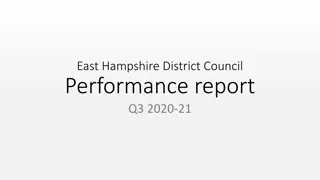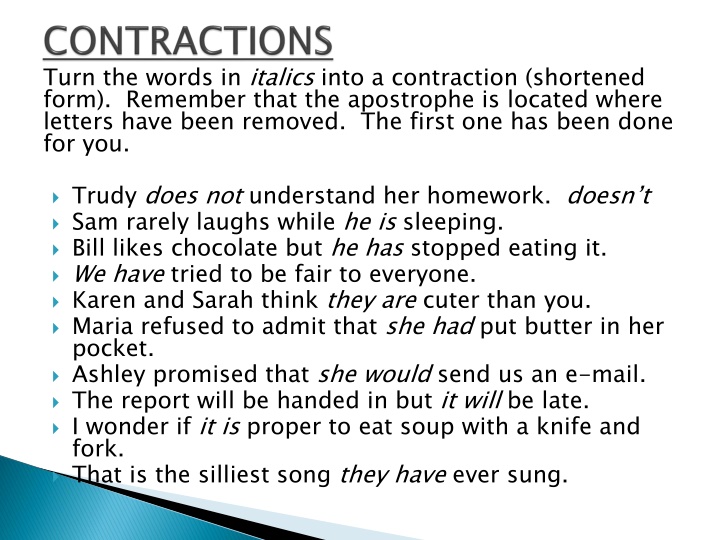
Improve Your Language Skills with Fun Word Activities
Enhance your language skills with engaging word activities like forming contractions, describing pirates with adjectives, exploring words with multiple meanings, and transitioning between verbs and nouns. Get ready for a challenging yet enjoyable learning experience!
Download Presentation

Please find below an Image/Link to download the presentation.
The content on the website is provided AS IS for your information and personal use only. It may not be sold, licensed, or shared on other websites without obtaining consent from the author. If you encounter any issues during the download, it is possible that the publisher has removed the file from their server.
You are allowed to download the files provided on this website for personal or commercial use, subject to the condition that they are used lawfully. All files are the property of their respective owners.
The content on the website is provided AS IS for your information and personal use only. It may not be sold, licensed, or shared on other websites without obtaining consent from the author.
E N D
Presentation Transcript
Turn the words in italics into a contraction (shortened form). Remember that the apostrophe is located where letters have been removed. The first one has been done for you. Trudy does not understand her homework. doesn t Sam rarely laughs while he is sleeping. Bill likes chocolate but he has stopped eating it. We have tried to be fair to everyone. Karen and Sarah think they are cuter than you. Maria refused to admit that she had put butter in her pocket. Ashley promised that she would send us an e-mail. The report will be handed in but it will be late. I wonder if it is proper to eat soup with a knife and fork. That is the silliest song they have ever sung.
Pirates Pirates, pirates, , pirates, pirates pirates __________, __________, __________ pirates, __________, __________, __________ pirates, Choose a letter. For example, c . Choose three adjectives beginning with c to describe the pirates. For example, cold, cunning, Choose a letter. For example, c . Choose three adjectives beginning with c to describe the pirates. For example, cold, cunning, cannibal. cannibal. The adjectives you choose must have one, two then three syllables in them. Repeat with a different letter.
Some words can be classed as several different types of words, for example, a noun in one sentence and a verb in another! Take the word park . It has two different meanings and can be used in two different ways. Look at the following sentences. What type of word is park in each one? You can t park the car in the city centre. ____________ Children like playing in the park. _____________ Can you think of any more words like this? Here are a few more to start you off. - part Write pairs of sentences for five words showing the two different ways they can be used. - hand - shop - table - party
Some words start off as verbs and then become nouns as well. For example: to take away > a take-away to eat > eats to put on > a put-on Some nouns become verbs too. For example: an audition > to audition service > to service rubbish > to rubbish Can you think of any more?
You will need either a mini-whiteboard or a piece of lined paper and a pencil. Draw six columns with headings as shown below: Choose four letters and write them in the table. Taking each letter in turn, see if you can make a sentence, each word beginning with the letter given. The sentence must make sense. The first to do so wins. An example is given to start you off. ADJECTIVE NOUN ADVERB VERB ADJECTIVE NOUN b big boys brutally bash bald bullies
Work in groups of no more than six. On the top of your piece of paper, write down an adjective. Fold the piece of paper over and pass it to the person on your left. Jot down a noun, fold the paper and pass it along. Repeat the process with an adverb, a verb, another adjective and another noun. When you have finished, fold out the piece of paper and read out the sentences. ADJECTIVE NOUN ADVERB VERB ADJECTIVE NOUN
These words take the place of nouns and are therefore called PRONOUNS . Here are the most important ones in the singular. Can you work out the plurals? Singular I, me You He, him, she, her, it My, mine Your, yours His, her, hers, its Now fill in the blanks in the following passage: I have a dog called Sam. ________ love ________ but he can be very mischievous. One day my friends and ________ were coming home from school when ________ dog, Sam, ran out into the road and chased ________ friend Mick up the hill. ________ got scared and jumped over a fence into someone s garden. ________ shouted at Sam to come to ________ but ________ refused. An old man came out of the house brandishing a stick. ________ was scowling and looked furious. ________ all legged it down the hill and Sam followed ________. When ________ got home my mum said, Why are ________ so hot and bothered? That old man up the road flipped ________ lid because Sam ran into ________ garden, I replied. _____________________ Plural ____________ ____________ ____________ ____________ _____________________
Prepositions are the little words that join up the more important nouns, adjectives, verbs and adverbs. These are words like the following: from, in on, by, at, of, to Preposition Poem Take each preposition in turn and make it the first word in a line of a poem. Then fill in the line. Try to make the poem make sense! The first line is written for you below as an example. You may choose a different line if you prefer. From Monday to Friday I go to school In .. On .. By .. At .. Of .. To ..
T Informal English Standard English
she sang at the concert. the dog ran in circles. I watch the wings vibrate. because the monster was making him scared. when his team wins. My brother is happy As the plane takes off He stopped reading Whenever he chased his tail, Although she felt sad,
Combine each pair of sentences into one sentence containing a subordinate clause Example A)John was travelling by train. He was going to visit his grandma. =John, who was going to visit his grandma, travelled by train. B) Sabrina chose to walk to the party. She was wearing her favourite dress. C) The dog growled at the man. It moved closer to him. D) She opened the door of the cage. She hoped her pet was still inside.
Keen to go home, John threw a tantrum. Speaking from his heart, he displayed how he really felt. My barber, who is very wealthy, cut his prices. Whenever it snows, the mountains look beautiful. The DVD, which I bought yesterday, was already damaged. Until the bridge was built, people crossed the river by boat.
Ive just bought Justin Biebers new album, [wh ] is awful. It s for my best friend John, [wh ] lives in New York. It was in Devon [wh ] there was a terrible outbreak of foot and mouth disease. I meant that bottle of lemonade [wh ] has probably gone a bit flat. Sarah [wh ] is packing for her holidays, is a bit tired.
Type of word Type of word Definition Definition Noun Joins two sentences or part of a sentence Describes a noun Introduces a noun Helps the main verb in a sentence Describes a verb Is a person, place or thing Is a doing or being word Verb Auxiliary verb Adjective Preposition Conjunction Article
Copy out the following sentences, underlining the qualifying words used in each one. E.g. it is hard to understand shaved off his eyebrows. E.g. it is hard to understand completely shaved off his eyebrows. completely why he why he 1) They mostly attack after dark. 2) You might guess from her squint that she is partially sighted. 3) Teenagers hardly ever pay attention to their elders. 4) I think you will find that you are slightly mistaken.
I is wait o favourite . my clock, thats when four ,, cartoon on can t Spongebob until I can t wait until four o clock, that s when my favourite cartoon, Spongebob, is on.
world the The seven people of number now in has exceeded billion. The number of people in the world has now exceeded seven billion.
"dreamt" "-mt" Ends English in is letters only that The the with word The only word in English that ends with the letters "-mt" is "dreamt
"rhythm". (a, e, i, o or u) a English is longest The true vowel without word The longest English word without a true vowel (a, e, i, o or u) is "rhythm
"triskaidekaphobia" 13th. fear Friday means of The the word The word "triskaidekaphobia" means "fear of Friday the 13th .

